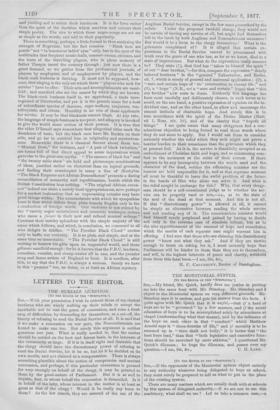LETTERS TO THE EDITOR.
THE BURIALS QUESTION.
ITO THE EDITOR or THE n SPROTATOR.1
Sin,—With your permission I wish to entreat those of my clerical brethren who are wisely making up their minds to accept the inevitable not to mar the grace of concession, and raise a fresh crop of difficulties, by demanding for themselves, as a set-off, the liberty of refusing to read the Burial Service at all. It is said that if we make a concession on our part, the Nonconformists are bound to make one too. But surely this argument is neither generous nor just. What is really needed is, that the matter should be settled on the best and fairest basis, in the interests of the community at large. If it is in itself right and desirable that the clergy should have the discretionary power of refusing to read the Burial Service, let it be so, but let it be decided on its own merits, and not claimed as a compensation. There is always something plausible about the notion of compromise and mutual concession, and perhaps, if this particular concession is pressed for very strongly on behalf of the clergy, it may be granted to them by the good-nature of Parliament. But it is as well to inquire, first, in whose behalf the concession is demanded. Is it in behalf of the laity, whose interest in the matter is at least as great as that of the clergy ? Would it be really any boon to them ? As the law stands, they are assured of the use of the Anglican Burial Service, except in the few cases prescribed by the rubric. Under the proposed twofold change, they would not be certain of having any service at all, but might find themselves left in the lurch by both Anglican and Nonconformist ministers ? But would it be a boon to the clergy themselves ? What is the
grievance complained of ? It is alleged that certain ex- pressions in the Burial Service cannot be pronounced with truth over the grave of one who has, as far as we know, died in a state of impenitence. But what do the expressions really amount to P They state (1), that God has "taken to himself the spirit" of our "dear brother,"—for this, compare the expression" dearly beloved brethren " in the "general" Exhortation, and Eccles. xii. 7, which is surely of general and universal application ; (2), a. "sure and certain hope of 'the' resurrection to eternal life ;" and (3), a " hope " (N.B., not a "sure and certain" hope) that "this our brother "now rests in Jesus. Evidently this language has been most carefully and deliberately chosen, in such terms as to avoid, on the one hand, a positive expression of opinion on the in- dividual case, and on the other hand, to allow and encourage the utmost latitude of charitable hope. And surely this is in true accordance with the spirit of the Divine Master (Matt. vii. 1, Rom. xiv. 10), and of the charity that " hopeth all things." I am quite aware that many clergymen feel a con- scientious objection to being forced to read these words where they do not seem to apply. But I would ask them to consider seriously whether the relief which they seek might not prove a heavier burden to their conscience than the grievance which they at present feel. As it is, the service is thankfully accepted as an. embodiment of Christian faith and hope, and as ministering com- fort to the mourners at the crisis of their sorrow. If there appears to be any incongruity between the words used and the character of the dead, neither the officiating minister nor the hearers are held responsible for it, and at that supreme moment all must be thankful to leave the awful problem of the future in the hands of Him who alone can solve it. And what is. the relief sought in exchange for this? Why, that every clergy- man should be a self-constituted judge as to whether the ser- vice can be properly used or not,—i.e., as to the state of the soul of the dead at that moment. And this is not all. If this "discretionary power" is allowed at all, it cannot, be simply an alternative between reading the whole service and not reading any of it. The conscientious minister wouli find himself sorely perplexed and pained by having to decide not only in the extreme case of absolute refusal, but as to the nice apportionment of the amount of hope and consolation which the merits of each separate case might warrant him in. offering. I feel sure that those who are claiming this discretionary power "know not what they ask." And if they are Unwise enough to insist on asking for it I most earnestly hope that Parliament will be kinder to them than they are to themselves, and will, in the highest interests of peace and charity, withhold from them this fatal boon.-1 am, Sir, &e.,
H. C. CALVERLEY, Rector of Bassingham.






























 Previous page
Previous page